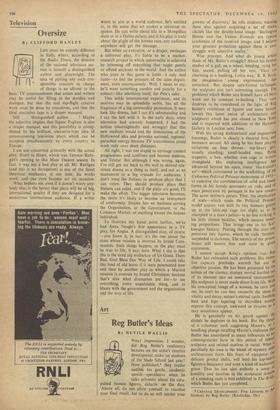Television
Oversize
By CLIFFORD HANLEY
Still . . 'distinguished' author . . . Maybe the adjective implies that Signor Pugliese is also a draper manqué, and this possibility is streng- thened by his brilliant, executive-type idea of commissioning television plays which can be accepted simultaneously by every country in Europe. I am not concerned primarily with the actual play, Heart to Heart, which was Terence Ratti- gan's opening to this Mass Theatre season. In fact, it was not a bad play at all. Mr. Rattigan (and this is no derogation) is one of the finest theatrical mechanics of our time, his works work, and can even become art on occasion.
What bothers me, even if it doesn't worry any- body else, is the heresy that plays will be of big, international quality if they are designed for a monstrous international audience. If a writer
wants to aim at a world audience, he's entitled to, in the sense that art evokes a universal re- sponse. He can write about life in a Mongolian slum or in a Dallas palace, and if his play is truly about the plight of the human race, any audience anywhere will get the message.
But when an executive, or a draper, envisages a universal play, it's liable to be a market- research project in which universality is achieved by trimming off everything that might puzzle or offend anybody in the world. And the author who joins in this game is liable-1 only said liable—to feel the pressure of the sales depart- ment, even unconsciously. Well, I mean to say, he'll want something surefire and punchy for a subject—like television itself, for Pete's sake. This noble international experiment, and its motives may be splendidly noble, has all the fragrance of a big commodity promotion. It may look like drama, but I say it's salesmanship and I say the hell with it. In the early days, when television had scarcely happened, I had the notion (shortsightedly and wrongly) that this new medium would end the domination of the Hollywood idea and provoke national, regional, parochial energy because TV transmission could work only over short distances.
All right, I was too stupid to envisage canned programmes and landlines and booster stations, and Telstar. But although I was wrong, again, I've still got my back to the wall to defend tele- vision drama as a thing in itself, and not as an instrument in a big crusade for audiences. I don't want the Italians to produce plays that I can enjoy. They should produce plays that Italians can enjoy, and if the plays are good, make the effort. The bigger television becomes. the more it's likely to become an instrument of conformity. Drama has no business serving the Organisation, or the Government, or the Common Market, or anything except the human individual.
To illustrate my banal point further, we've had Anna Neagle's first appearance in a TV play, for Anglia. A distinguished play, of course —you know it, in fact, it's the one about the nuns whose mission is overrun by brutal Com- munists. Such things happen, so the play must be true to life, it says here. What I say is that this is the tired old mullarkey of Us Good. Them Bad, God Bless Our Way of Life. I could take this load of old boots if it were punctuated now and then by another play in which a Marxist mission is overrun by brutal Christians; because that's also what dramatists are for—to see everything, every unpalatable thing, and to blazes with the government and the organisation and the way of life.


































 Previous page
Previous page